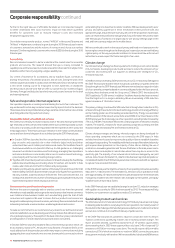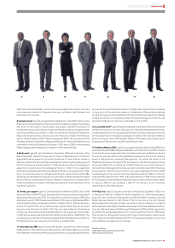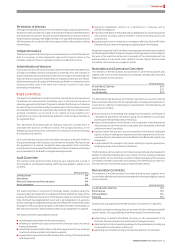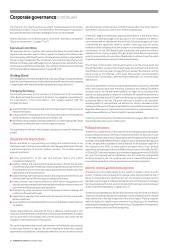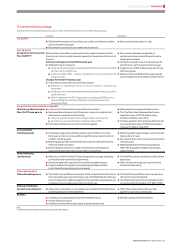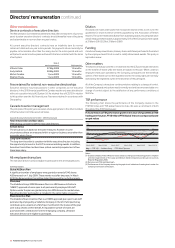Vodafone 2010 Annual Report Download - page 54
Download and view the complete annual report
Please find page 54 of the 2010 Vodafone annual report below. You can navigate through the pages in the report by either clicking on the pages listed below, or by using the keyword search tool below to find specific information within the annual report.
52 Vodafone Group Plc Annual Report 2010
Corporate governance continued
On appointment individual directors undergo an induction programme covering,
amongst other things:
the business of the Group;
their legal and regulatory responsibilities as directors;
briefings and presentations from relevant executives; and
opportunities to visit business operations.
If appropriate the induction will also include briefings on the scope of the internal
audit function and the role of the Audit Committee, meetings with the external
auditor and other areas the Company Secretary deems fit considering the director’s
area of responsibility. Following discussion with the Chairman and senior independent
director, the Company Secretary provides a programme of ongoing training for
the directors which covers a number of sector specific and business issues as well
as legal, accounting and regulatory changes and developments relevant to
individual director’s areas of responsibility. Throughout their period in office the
directors are continually updated on the Group’s businesses and the regulatory and
industry specific environments in which it operates. These updates are by way of
written briefings and meetings with senior executives and, where appropriate,
external sources.
Performance evaluation
Performance evaluation of the Board, its committees and individual directors takes
place on an annual basis and is conducted within the terms of reference of the
Nominations and Governance Committee with the aim of improving individual
contributions, the effectiveness of the Board and its committees and the Group’s
performance. This year the performance evaluation was conducted by an
independent external advisor, MWM Consulting (‘MWM’). This process involved:
MWM devising an appropriate questionnaire, with assistance from the Chairman,
which was sent to all Board members;
MWM undertaking individual meetings with each Board member and the Company
Secretary on Board performance; and
in conjunction with the Chairman, MWM producing a report on Board per formance
using the completed questionnaires and individual meetings which was sent to
and considered by the Nominations and Governance Committee before being
discussed with Board members at the following Board meeting.
The evaluation was designed to determine whether the Board continues to be
capable of providing the high level judgement required and whether, as a Board, the
directors are informed and up to date with the business and its goals and understand
the context within which it operates. The evaluation also included a review of the
administration of the Board covering its operation, its agenda, the reports and
information produced for its consideration, committee processes and the Board’s
relationship with its committees. MWM reported that the Board is strong and
effective. The Board has chosen to broaden and deepen its focus on strategic topics
and to continue to strengthen its capabilities in technology and is gaining insights
into changing consumer behaviour.
The Chairman also held individual meetings with each non-executive director and
the Chief Executive to discuss their individual performance. The Chief Executive
undertook the performance reviews for the executive directors and the senior
independent director conducted the review of the performance of the Chairman by
having individual meetings with all the other directors and the Company Secretary.
Following this process the senior independent director produced a written report
which was discussed with the Chairman. The report’s findings reflected MWM’s view
that the Chairman provides outstanding leadership in focusing the Board’s efforts
and ensuring open and constructive debate.
The evaluation of each of the Board committees was undertaken using observations
from the MWM report. These were then discussed by each of the committees. The
evaluations found that the committees operate efficiently and effectively.
The evaluations undertaken in the 2010 financial year found the performance of
each director to be effective and concluded that the Board provides the effective
leadership and control required for a listed company. The Nominations and
Governance Committee confirmed to the Board that the contributions made by the
directors offering themselves for re-election at the AGM in July 2010 continue to be
effective and that the Company should support their re-election. The Board will
continue to review its procedures, its effectiveness and development in the financial
year ahead.
There are no cross-directorships or significant links between directors serving on the
Board through involvement in other companies or bodies. For the purpose of section
175 of the Companies Act 2006, the Company’s articles of association include a
general power for the directors to authorise any matter which would or might
otherwise constitute or give rise to a breach of the duty of a director under this
section, to avoid a situation in which a director has, or could have, a direct or indirect
interest that conflicts or may possibly conflict, with the interests of the Company. To
this end procedures have been established for the disclosure of any such conflicts
and also for the consideration and authorisation of these conflicts by the Board,
where relevant. The directors are required to complete a conflicts questionnaire,
initially on appointment and annually thereafter. In the event of a potential conflict
being identified, details of that conflict would be submitted to the Board (excluding
the director to whom the potential conflict related) for consideration and, as
appropriate, authorisation in accordance with the Companies Act 2006 and the
articles of association. Where an authorisation was granted, it would be recorded in
a register of potential conflicts and reviewed periodically. On an ongoing basis
directors are responsible for notifying the Company Secretary if they become aware
of actual or potential conflict situations or a change in circumstances relating to an
existing authorisation. To date, no conflicts of interest have been identified.
Under the laws of England and Wales, the executive and non-executive directors are
equal members of the Board and have overall collective responsibility for the
Company’s direction. In particular, non-executive directors are responsible for:
bringing a wide range of skills and experience, including independent judgement
on issues of strategy, performance, financial controls and systems of risk
management;
constructively challenging the strategy proposed by the Chief Executive and
executive directors;
scrutinising and challenging performance across the Group’s business;
assessing risk and the integrity of the financial information and controls; and
ensuring appropriate remuneration and succession planning arrangements are in
place in relation to executive directors and other senior executive roles.
Board effectiveness
Appointments to the Board
There is a formal, rigorous and transparent procedure, which is based on merit and
against objective criteria, for the appointment of new directors to the Board. This is
described in the section on the Nominations and Governance Committee set out on
page 53.
Samuel Jonah was identified as a potential candidate by internal sources and
subsequently recommended to the Board by the Nominations and Governance
Committee on the basis of his wealth of business experience in Africa, particularly
South Africa and Ghana where we have made important investments recently. Michel
Combes and Stephen Pusey were proposed for appointment following assessment
of their performance and their potential contribution by the Nominations and
Governance Committee and the whole Board subsequently discussed the proposal
before their appointments were confirmed.
Information and professional development
Each member of the Board has immediate access to a dedicated online team room
and can access monthly information including actual financial results, reports from
the executive directors in respect of their areas of responsibility and the Chief
Executive’s report which deals, amongst other things, with investor relations, giving
Board members an opportunity to develop an understanding of the views of major
investors. These matters are discussed at each Board meeting. From time to time
the Board receives detailed presentations from non-Board members on matters of
significance or on new opportunities. Financial plans, including budgets and
forecasts, are regularly discussed at Board meetings. The non-executive directors
periodically visit different parts of the Group and are provided with briefings and
information to assist them in performing their duties.
The Chairman is responsible for ensuring that induction and training programmes are
provided and the Company Secretary organises the programmes. Individual directors
are also expected to take responsibility for identifying their training needs and to take
steps to ensure that they are adequately informed about the Company and their
responsibilities as a director. The Board is confident that all its members have the
knowledge, ability and experience to perform the functions required of a director of
a listed company.






